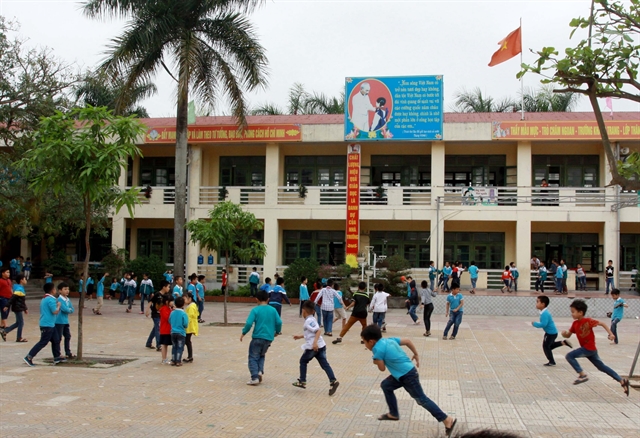 Society
Society

For one 15-year-old pupil at a school in Hưng Yên Province, March 22 will be a day forever etched into her memory.

|
| Students in Vũ Thư Town, Thái Bình Province play during the break. Experts recommend improving civil education and life skills to prevent school assault. |
HƯNG YÊN — For one 15-year-old pupil at a school in Hưng Yên Province, March 22 will be a day forever etched into her memory.
A day she will never forget.
The ninth grader was subjected to a humiliating assault at the hands of five of her classmates. She was stripped naked, tossed onto the ground, kicked and punched in the face.
All of the accused are girls. The attack was recorded on a mobile telephone and circulated on social media.
The purpose of schools is to educate children for later life in skills such as maths, English and sciences.
All are useful when the child leaves school to start the next stage of their young lives.
But one subject of the curriculum that seems to be more relevant today after this sickening attack is civil education.
This particular lesson teaches children the difference between right and wrong, and more importantly, the consequences they could face if they cross the line of decency.
Paying attention in this class may be too late for the victim of last month’s assault.
“I forgive them but cannot go back to school,” she told Thanh niên newspaper. “It scares me thinking of last Friday event and other beatings.”
The girl, who has long been a target of bullies, comes from a disadvantaged family. With a sick father, her mother spends most of her time earning for family, often leaving the children to look after themselves.
The girl’s family has been assured all recordings of the incident have been deleted but the victim herself is still mentally scarred and is receiving treatment at the provincial Psychiatric and Mental Hospital for psychological trauma.
The principle of the school has been suspended along with a teacher following the incident.
Local authorities have also launched an investigation into the case and asked the provincial Department of Labour, Invalids and Social Affairs to support the victim.
Preventative methods
This is by no means an isolated incident.
On Monday a video surfaced showing a seventh grader in Diễn Châu District, Nghệ An Province on her knees while four students kicked and slapped her.
Nguyễn Tùng Lâm, head of Hà Nội Association of Education and Psychology, said when teachers fail to deal with violent pupils, it gives them free reign to continue to misbehave.
He recommended having appropriate punishments such as forcing them to work in the community in a bid to make them more responsible.
Nguyễn Xuân Khang, principal of Hà Nội’s Marie Curie High School, who has more than 40 years teaching experience said because pupils are unable to express themselves in school, many often become ill-disciplined.
According to Khang, every student should be treated as individual, especially during the teenager years when they face troubles in communicating with families, friends and teachers.
Students need proper legal education to prevent similar incidents from happening.
Lawyer Đặng Văn Cường from Hà Nội Bar Association told the Vietnam News Agency that the gang seriously violated laws and showed signs of two crimes including “deliberate infliction of bodily harm upon another person" (Article 134 of Criminal Code) and "Insults to another person" (Article 155 of Criminal Code).
Lawyer Giang Hồng Thanh from Giang Thanh Law Firm, said students were lacking of social and legal knowledge, especially secondary school students.
In seminars with students, he usually presents scenarios similar to the Hưng Yên incident.
“We explain to them to understand that by assaulting and insulting others they will violate the laws and may go to jail,” said Thanh. “However, many students were surprised hearing this. They just simply did not know it was a crime,”
“Therefore, it is essential to increase the number of life skills lessons in curricula as well as legal seminars so they know what is allowed and what is prohibited. I think it is the best way to end school assaults,” he added. — VNS




